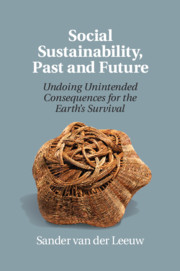Index
Published online by Cambridge University Press: 13 December 2019
- Type
- Chapter
- Information
- Social Sustainability, Past and FutureUndoing Unintended Consequences for the Earth's Survival, pp. 493 - 516Publisher: Cambridge University PressPrint publication year: 2020
- Creative Commons
- This content is Open Access and distributed under the terms of the Creative Commons Attribution licence CC-BY-NC-SA 4.0 https://creativecommons.org/cclicenses/

